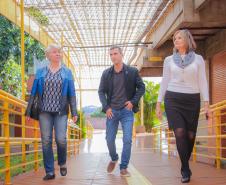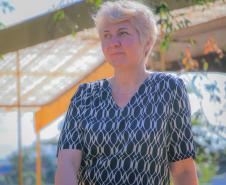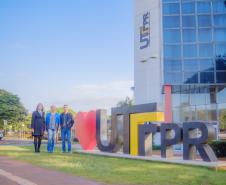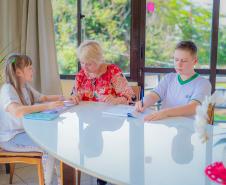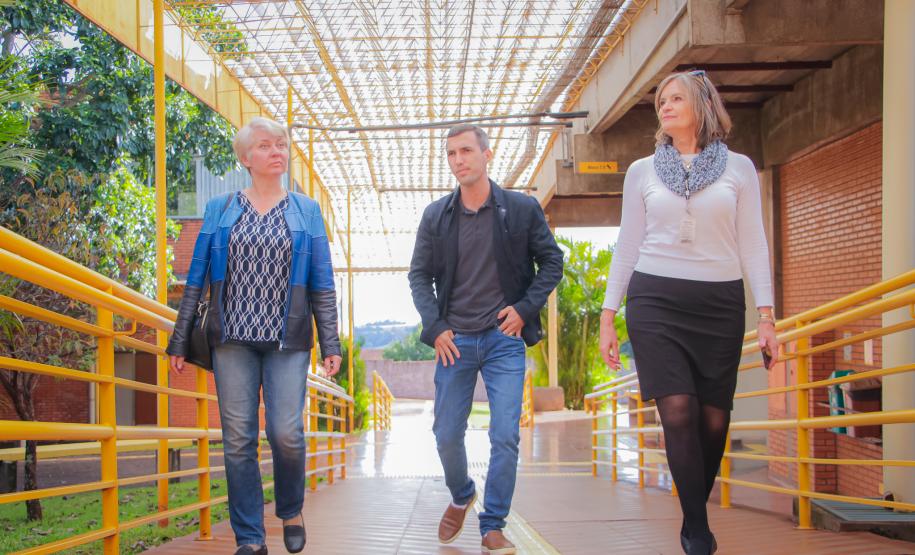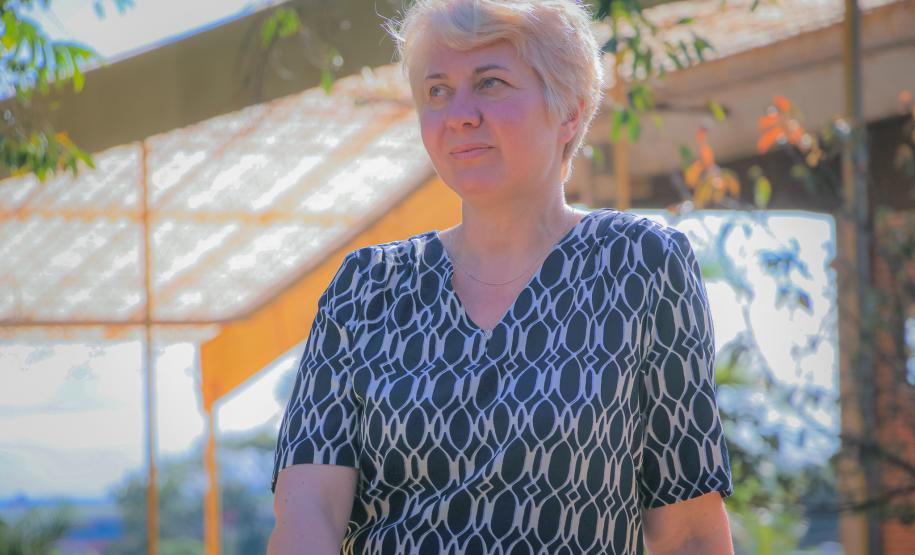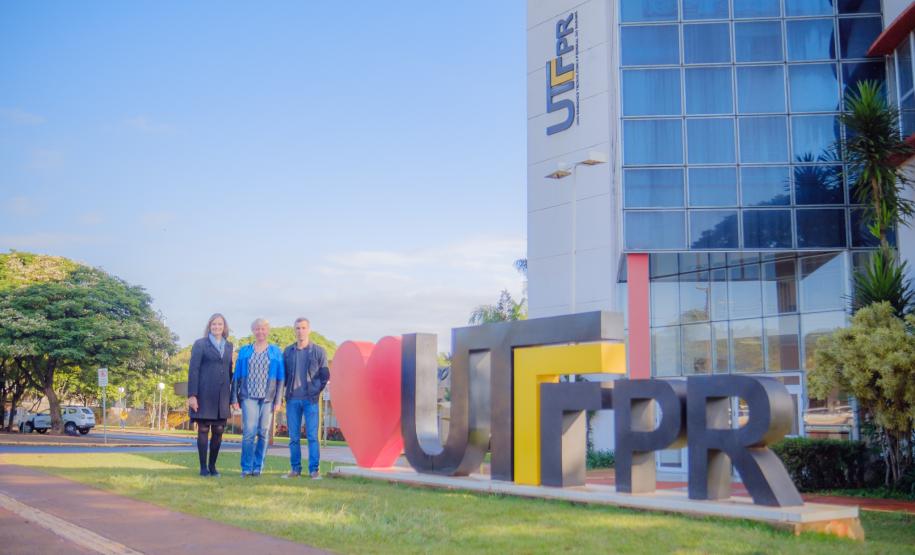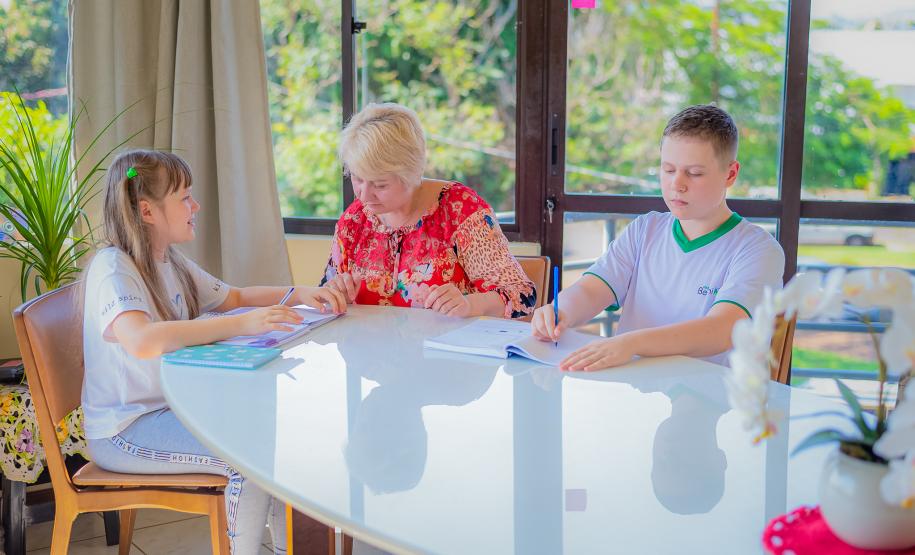O próprio lugar: Com nova vida no Paraná, Svitlana Gerasimenko pesquisa astroquímica em Universidade 24/08/2023 - 00:41
Os olhos que viviam focados no céu e nas estrelas agora se encantam com o que está mais próximo. Desde que chegou em Medianeira - oeste do Paraná, em 19 de junho de 2022, Svitlana Gerasimenko observa com encanto tudo o que a rodeia. Vinda de Kiev, capital da Ucrânia, o novo lugar é diferente de tudo o que vivenciou na vida pessoal e acadêmica. Entre tantas novidades, uma ficou no coração desde o primeiro dia: o próprio lugar para trabalhar e pesquisar astroquímica.
Svitlana é uma cientista acostumada com nomes de estrelas e planetas. Doutora em Astrofísica e professora do Instituto de Pesquisa Espacial e do Observatório Astronômico da Academia Nacional de Ciências de Kiev, a pesquisadora chegou ao Campus da Universidade Tecnológica Federal do Paraná (UTFPR) para se deparar com novas nomenclaturas. "Essa é a sala em que você vai ficar, ainda está com o nome do professor antigo, mas em breve vamos alterar", informou o diretor do Campus, Claudio Bazzi.
Enquanto passava pelos corredores e conhecia as salas, os olhos brilhavam. "Que máquina enorme!", sorria, ao conhecer as instalações. Era o vislumbre do novo futuro, longe da Guerra e junto dos filhos Marharyta e Lev.
Os olhos percorriam todo o ambiente, as paredes brancas, a mesa e o computador. "Meu lugar…eu nunca…tive meu próprio espaço!", falava pausadamente enquanto admirava o que seria o seu lugar pelos próximos dois anos.
No trabalho
Svitlana e os filhos foram a segunda família a ser recebida por meio do Programa Paranaense de Acolhida aos Cientistas Ucranianos, implantado pela Fundação Araucária. No primeiro dia que conheceu a universidade, logo cumprimentou alguns alunos. "Estudantes muito interessados. Vocês sabem quantos planetas temos em nosso sistema solar?", perguntou. Entre as respostas "Vênus", "Mercúrio" e "Urano", um sorriso para cada interação com os acadêmicos. Era o começo de uma jornada com a física brasileira
"Com meus colegas astrofísicos, aqui na UTFPR modelamos a evolução química de vários gelos em uma situação astrofísica semelhante", explica a pesquisadora. Os gelos astrofísicos desempenham um papel decisivo na formação de grandes moléculas orgânicas no espaço frio. Os dados experimentais da pesquisa de Svitlana foram obtidos nas instalações do Laboratório Nacional de Luz Síncrotron em Campinas, pelo Grupo de Astroquímica e Astrobiologia da Universidade do Vale do Paraíba. "Agora, estamos terminando o trabalho no artigo", informa.
Entre leituras e pesquisa, o trabalho não para - Svitlana está preparando uma palestra para professores em escolas da região sobre astroquímica, que está marcada para setembro. "É importante para mim não apenas contar o que é astroquímica e como surgiram os elementos químicos, mas também mostrar a conexão deste assunto com outras ciências", conta a pesquisadora que também planeja mostrar as diferenças em algumas das definições usadas por astrônomos e outros especialistas.
A pesquisa está em andamento junto com os professores do Departamento Acadêmico de Física, da área de Astroquímica e Instrumentação Astronômica, como informa o orientador de Svitlana, professor Fábio Rogerio Longen. "A pesquisa basicamente tem sido fazer simulação computacional da interação entre a radiação ionizante e moléculas na fase gelo", informa.
Todo o trabalho também é sucesso pela relação participativa e comunicativa com Svitlana, segundo Fábio. "Ela está sempre aberta para conversar sobre os assuntos, sempre com um sorriso no rosto", descreve. O grupo de pesquisa aguarda a chegada de um telescópio, para desenvolvimento de projetos de ensino e extensão na área de astronomia junto da comunidade. "Queremos fazer observações de estrelas e planetas com alunos do ensino fundamental e médio, com o objetivo de despertar o interesse pela ciência e o universo", completa Fábio.
Ao longo da pesquisa, Svitlana debate resultados, revisa literatura, escreve artigos e realiza simulações científicas com o colega de trabalho Geanderson Carvalho. "A Svitlana é muito empenhada em aprender e tem nos ajudado bastante". A pesquisa da dupla estuda a interação da radiação com moléculas que estão na fase gelo e ficam no espaço. "Essa interação leva, entre outras coisas, ao aumento da complexidade molecular, incluindo possivelmente compostos prebióticos [fibras não-digeríveis que estimulam o crescimento de outros seres vivos]".
Com estudos de comparação e simulações computacionais com dados experimentais, a dupla já encontrou alguns resultados. "Eles estão compilados em um artigo e serão submetidos para revisão por pares nos próximos dias. Ainda pretendemos contribuir com a área e produzir mais nos próximos meses", finaliza.
Em casa
Quando não está na Universidade, Svitlana passa seus dias com seus dois filhos e o gato de estimação - o marido ficou na Ucrânia, pois ainda está em idade militar. Enquanto vivem separados, um em cada continente, os três buscam formar uma nova rotina no Paraná.
"Meus filhos estudam simultaneamente em duas escolas - ucraniana e brasileira. Agora é mais fácil para as crianças, porque já começaram as férias de verão na escola ucraniana e as férias de inverno na escola brasileira", conta a mãe. Em casa, para aprender português, há etiquetas com os nomes de cada objeto e cômodo: "banheiro", na porta, "cafeteira", na cozinha e "gato", na coleira do animal de estimação.
A família encontrou hobbies de acordo com interesses de cada um - Lev visita o clube de escoteiros e Marharyta gosta de desenhar e praticar esportes equestres. Para Svitlana, o trabalho e o lazer se misturam. "Medianeira é uma cidade incrível, com pessoas muito abertas e amigáveis. Há um grupo de amantes da astronomia aqui. Todos os dias compartilhamos notícias e discutimos vários assuntos da astronomia", conta.
Acostumada com uma capital de mais de dois milhões de habitantes, como Kiev, a ucraniana diz estar adaptada a morar no município com pouco mais de 46 mil pessoas. "Aqui tem um incrível céu estrelado. Gosto de morar em Medianeira e trabalhar na UTFPR", completa.
-----------------------------------------------------------------------------------------------------------------------------------------------------------------------------------------------------------------------------------
Her own place: With a new life in Paraná, Svitlana Gerasimenko researches Astrochemistry at University
The eyes that used to focus on the sky and the stars are now enchanted by what is closer. Since arriving in Medianeira - western Paraná, on June 19, 2022, Svitlana Gerasimenko has been watching everything around her with delight. Coming from Kiev, the capital of Ukraine, the new place is different from everything she has experienced in her personal and academic life. Among so many novelties, one has stayed in her heart from day one: the very place to work and research astrochemistry.
Svitlana is a scientist used to the names of stars and planets. A PhD in astrophysics and a professor at the Space Research Institute and the Astronomical Observatory of the National Academy of Sciences in Kiev, the researcher arrived at the campus of the Federal Technological University of Paraná (UTFPR) to encounter new nomenclatures. "This is the room where you will stay, it still has the name of the old professor, but we will soon change it", informed the director of the Campus, Claudio Bazzi.
As she walked through the corridors and got to know the rooms, her eyes sparkled. "What a huge machine!", smiled, as she got to know the facilities. It was a glimpse of the new future, far from the war and with her children Marharyta and Lev.
Her eyes roamed around the white walls, the desk and the computer. "My place... I never... had my own space!", she spoke slowly as she admired what would be her place for the next two years.
At work
Svitlana and her children were the second family to be welcomed through the Parana Program for Welcoming Ukrainian Scientists, implemented by the Araucaria Foundation. The first day she visited the university, she immediately greeted some students. "Very interested students. Do you know how many planets we have in our solar system?" she asked. Between the answers "Venus", "Mercury" and "Uranus", a smile for each interaction with the academics. It was the beginning of a journey with Brazilian physics.
"With my astrophysicist colleagues, here at UTFPR we modeled the chemical evolution of several ices in a similar astrophysical situation", explains the researcher. Astrophysical ices play a decisive role in the formation of large organic molecules in cold space. The experimental data for Svitlana's research were obtained at the facilities of the National Synchrotron Light Laboratory in Campinas, by the Astrochemistry and Astrobiology Group of the University of Vale do Paraíba. "Now, we are finishing the work on the article," she says.
Between reading and research, the work doesn’t stop - Svitlana is preparing a lecture for teachers in schools in the region on astrochemistry, which is scheduled for September. "It is important for me not only to tell what astrochemistry is and how the chemical elements came about, but also to show the connection of this subject with other sciences," says the researcher who also plans to show the differences in some of the definitions used by astronomers and other experts.
The research is underway together with professors from the Academic Department of Physics, in the area of Astrochemistry and Astronomical Instrumentation, as informed by Svitlana's advisor, Professor Fábio Rogerio Longen. "The research has basically been to do computer simulation of the interaction between ionizing radiation and molecules in the ice phase," he says.
All the work is also a success due to the participative and communicative relationship with Svitlana, according to Fábio. "She is always open to talk about the subjects, always with a smile on her face", he describes. The research group is awaiting the arrival of a telescope to develop teaching and extension projects in the area of astronomy with the community. "We want to make observations of stars and planets with elementary and high school students, with the aim of arousing interest in science and the universe", adds Fábio.
Throughout the research, Svitlana debates results, reviews literature, writes articles and performs scientific simulations with co-worker Geanderson Carvalho. "Svitlana is very committed to learning and has helped us a lot". The pair's research studies the interaction of radiation with molecules that are in the ice phase and remain in space. "This interaction leads, among other things, to increased molecular complexity, possibly including prebiotic compounds [non-digestible fibers that stimulate the growth of other living beings]."
With comparison studies and computer simulations with experimental data, the pair have already found some results. "They are compiled in a paper and will be submitted for peer review in the coming days. We still intend to contribute to the area and produce more in the coming months", he concludes.
At home
When she's not at university, Svitlana spends her days with her two children and pet cat - her husband stayed in Ukraine because he's still on military age. While they live apart, one on each continent, the three are looking to form a new routine in Paraná.
"My children study simultaneously in two schools - Ukrainian and Brazilian. Now it's easier for the children, because they have already started summer vacations at the Ukrainian school and winter vacations at the Brazilian school," says the mother. At home, to learn Portuguese, there are labels with the names of each object and room: "banheiro" on the bathroom door, "cafeteira" in the kitchen and "gato" on the pet's collar.
The family have found hobbies according to their interests - Lev visits the scout club and Marharyta likes drawing and equestrian sports. For Svitlana, work and leisure blend together. "Medianeira is an amazing city with very open and friendly people. There is a group of astronomy lovers here. Every day we share news and discuss various astronomy topics," she says.
Accustomed to a capital of more than two million inhabitants, such as Kiev, the Ukrainian says she is adapted to living in the municipality with just over 46 thousand people. "There is an amazing starry sky here. I like living in Medianeira and working at UTFPR", she concludes.
Créditos das fotos: Henry Milléo e Luciane Navarro
Crédito do texto: Jéssica Natal.



